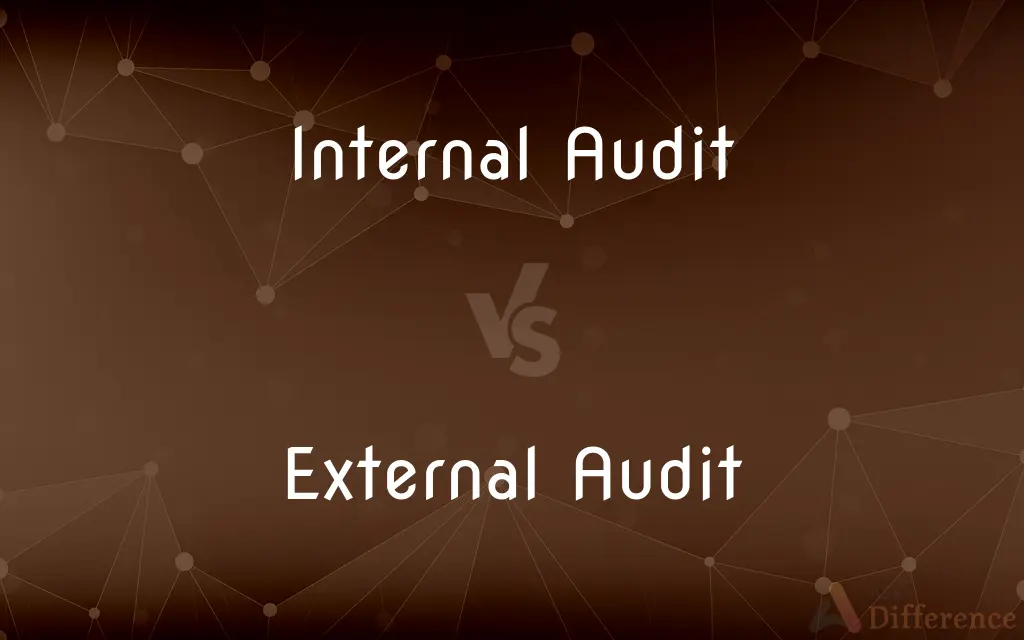Internal Audit vs. External Audit — What's the Difference?
By Tayyaba Rehman — Published on December 14, 2023
Internal Audit evaluates organizational processes and controls internally; External Audit provides independent assessment for stakeholders on financial statements.

Difference Between Internal Audit and External Audit
Table of Contents
ADVERTISEMENT
Key Differences
Internal Audit primarily focuses on assessing and improving an organization's internal controls, operations, and risk management processes. External Audit, on the other hand, evaluates the truth and fairness of an organization's financial statements, ensuring compliance with accounting standards.
Internal Audit functions are generally part of the organization and serve management by offering insights into internal processes. External Audit is performed by independent auditors who are not employees of the audited entity, ensuring objectivity in their assessments.
The scope of Internal Audit can be quite broad, covering areas like operational efficiency, compliance with policies, and fraud detection. External Audit has a narrower scope, zeroing in on the accuracy and reliability of financial statements and related disclosures.
While Internal Audit reports are intended for management's use and internal stakeholders, External Audit reports are designed for external stakeholders, such as investors, creditors, and regulatory agencies.
Comparison Chart
Primary Focus
Operational processes, risk management, controls
Accuracy and reliability of financial statements
ADVERTISEMENT
Auditors
Employees of the organization
Independent third-party auditors
Scope
Broad (efficiency, compliance, fraud detection)
Narrow (financial statements, related disclosures)
Intended Audience
Management and internal stakeholders
External stakeholders (investors, regulators)
Frequency
As needed by the organization
Typically annually or as required by regulations
Compare with Definitions
Internal Audit
Evaluates risk management and compliance within the organization.
The Internal Audit report highlighted potential compliance breaches.
External Audit
An independent review of an organization's financial statements.
The company hired a CPA firm for its annual External Audit.
Internal Audit
Provides recommendations for improvements.
Management acted on the recommendations made by the Internal Audit.
External Audit
Ensures compliance with accounting standards and regulations.
The External Audit found discrepancies in the financial reporting.
Internal Audit
A tool for management to improve organizational operations.
Following the Internal Audit, several process changes were implemented.
External Audit
Conducted by third-party auditors not affiliated with the organization.
The board reviewed the findings of the External Audit before publication.
Internal Audit
Conducted by employees within the organization.
The Internal Audit team met to discuss their upcoming reviews.
External Audit
Often mandated by regulations or stakeholders.
Publicly traded companies are required to undergo an External Audit.
Internal Audit
An assessment of an organization's internal controls and procedures.
The Internal Audit identified areas of operational inefficiency.
External Audit
Provides assurance to external stakeholders.
Investors awaited the results of the External Audit before making decisions.
Common Curiosities
Who primarily uses the results of an External Audit?
External stakeholders, such as investors, creditors, and regulatory agencies, use External Audit results.
Can an Internal Audit detect fraud within an organization?
Yes, one of the objectives of Internal Audit can be fraud detection and prevention.
Are Internal Audit findings confidential?
Generally, Internal Audit reports are for internal use and are not disclosed publicly.
What is the main purpose of an Internal Audit?
Internal Audit assesses and improves an organization's internal controls, operations, and risk management.
Is Internal Audit mandatory for companies?
Internal Audit's requirement varies, but it's often driven by organizational needs rather than external regulations.
How often is an External Audit conducted?
External Audits are typically conducted annually, but frequency can vary based on regulations and stakeholder requirements.
What happens if discrepancies are found in an External Audit?
Discrepancies can lead to restatements of financials, regulatory actions, or other consequences depending on severity.
Does an Internal Audit also review financial statements?
While they can review financial processes, the primary focus of Internal Audit is broader than just financial statements.
Who conducts an External Audit?
External Audit is performed by independent third-party auditors not affiliated with the organization.
Can the same person perform both Internal and External Audits?
No, to maintain objectivity and avoid conflicts of interest, these roles are distinct and separate.
Can External Audit make recommendations like Internal Audit?
External Auditors primarily comment on financial statement accuracy but can highlight control weaknesses without necessarily providing detailed remediation steps.
Is the External Audit report public information?
For publicly traded companies, External Audit reports are typically public. For private entities, it varies.
Who hires the Internal Audit team?
The organization itself hires and maintains the Internal Audit team, often reporting to senior management or the board.
Which is more extensive, Internal or External Audit?
The scope varies. Internal Audits are often broader in operational aspects, while External Audits focus intensively on financial statements.
Why is independence crucial for an External Audit?
Independence ensures objectivity and credibility in the External Audit's assessment.
Share Your Discovery

Previous Comparison
Biodegradable Substances vs. Non-Biodegradable Substances
Next Comparison
Isotopomer vs. IsotopologueAuthor Spotlight
Written by
Tayyaba RehmanTayyaba Rehman is a distinguished writer, currently serving as a primary contributor to askdifference.com. As a researcher in semantics and etymology, Tayyaba's passion for the complexity of languages and their distinctions has found a perfect home on the platform. Tayyaba delves into the intricacies of language, distinguishing between commonly confused words and phrases, thereby providing clarity for readers worldwide.











































